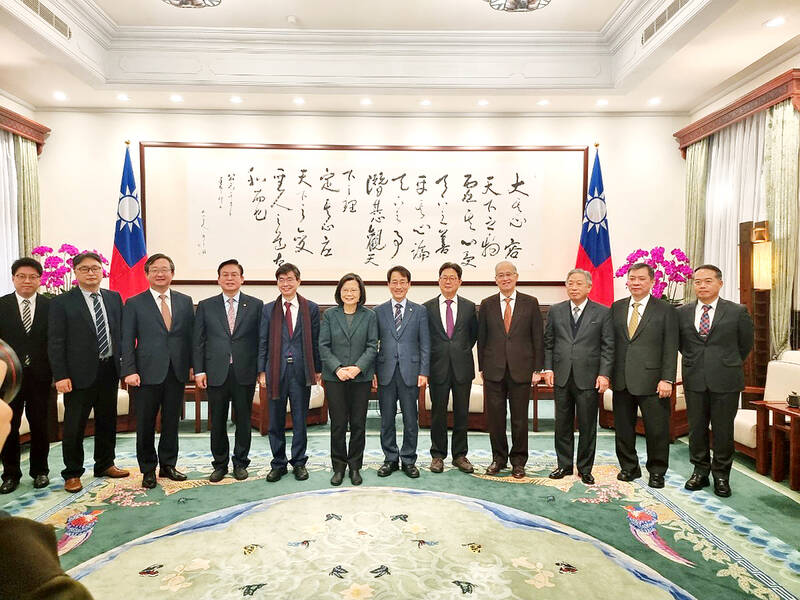The Ministry of Foreign Affairs yesterday criticized Beijing’s embassy in Seoul over “despicable” comments protesting a visit of a delegation to Taiwan last week led by South Korean National Assembly Deputy Speaker Chung Woo-taik.
In a post on WeChat, an embassy spokesperson said that the lawmakers’ visit contravenes the “one China” principle and harms the development of friendly relations between China and South Korea.
When referring to the visit, the spokesperson used the derogatory term cuan fang (竄訪), which equates the lawmakers to rats “scurrying” around. Beijing had used the term before when discussing then-US House of Representatives speaker Nancy Pelosi’s visit to Taiwan last year.

Photo from South Korean lawmaker Lee Dal-gon’s Facebook page
The spokesperson also said “Taiwan independence secessionist forces” and meddling by foreign forces were threatening stability in the Taiwan Strait.
Taiwan “solemnly censures” the Chinese ambassador in South Korea, who made comments that “seriously distorted facts and infringed on the dignity of South Korea and our country’s sovereignty,” the ministry said in a statement.
“China’s overturning of right and wrong, its uncouth language and its wolf warrior behavior can only be described as despicable,” the statement said.
Taipei’s reception of foreign guests, including major political figures and lawmakers, is “an exercise of national sovereignty and a normal activity of democracies,” it said.
The international community agrees that Taiwan and China are non-subordinate, sovereign nations, and that the People’s Republic of China has never governed Taiwan, the ministry said.
Taiwan and South Korea are democratic, sovereign countries, and Seoul has the right to conduct relations with any foreign nation it wishes, including Taiwan, it added.
The statement said that Beijing’s complaints are baseless, as the South Korea-Taiwan Friendship Association had visited the nation every year prior to the COVID-19 pandemic, and thanked the visiting lawmakers for their significant contributions to bilateral relations.
Taiwan and South Korea share the universal values of freedom, democracy and the rule of law, and have close ties in matters of substance including trade and mutual visits, it said.
The statement also said that Seoul declared the importance of maintaining peace and stability across the Taiwan Strait in 2020, and has often repeated that message since, including in last month’s publication of its strategic document for the Indo-Pacific region.
“Again, the Chinese government did not heed facts and acted in bad faith in its futile attempt to impede Taiwan’s conduct of normal relations with the rest of the world,” it said, calling for democratic countries to support Taiwan.
“China should stop its presumptuous behavior toward South Korea’s parliamentarian diplomacy,” South Korean lawmaker Cho Kyoung-tae said.
Beijing’s actions were “not the behavior of a normal country,” the Korea Times cited him as saying. “Interference into domestic affairs should not occur.”
Premier Su Tseng-chang (蘇貞昌) told a ribbon-cutting ceremony in New Taipei City that Beijing’s interference in Taiwan’s affairs makes China “a bad neighbor, always meddling and trying to start arguments.”
“The world judges China on its unneighborly behavior,” he added.

TRAGEDY STRIKES TAIPEI: The suspect died after falling off a building after he threw smoke grenades into Taipei Main Station and went on a killing spree in Zhongshan A 27-year-old suspect allegedly threw smoke grenades in Taipei Main Station and then proceeded to Zhongshan MRT Station in a random killing spree that resulted in the death of the suspect and two other civilians, and seven injured, including one in critical condition, as of press time last night. The suspect, identified as a man surnamed Chang Wen (張文), allegedly began the attack at Taipei Main Station, the Taipei Fire Department said, adding that it received a report at 5:24pm that smoke grenades had been thrown in the station. One man in his 50s was rushed to hospital after a cardiac arrest

A car bomb killed a senior Russian general in southern Moscow yesterday morning, the latest high-profile army figure to be blown up in a blast that came just hours after Russian and Ukrainian delegates held separate talks in Miami on a plan to end the war. Kyiv has not commented on the incident, but Russian investigators said they were probing whether the blast was “linked” to “Ukrainian special forces.” The attack was similar to other assassinations of generals and pro-war figures that have either been claimed, or are widely believed to have been orchestrated, by Ukraine. Russian Lieutenant General Fanil Sarvarov, 56, head

SAFETY FIRST: Double the number of police were deployed at the Taipei Marathon, while other cities released plans to bolster public event safety Authorities across Taiwan have stepped up security measures ahead of Christmas and New Year events, following a knife and smoke bomb attack in Taipei on Friday that left four people dead and 11 injured. In a bid to prevent potential copycat incidents, police deployments have been expanded for large gatherings, transport hubs, and other crowded public spaces, according to official statements from police and city authorities. Taipei Mayor Chiang Wan-an (蔣萬安) said the city has “comprehensively raised security readiness” in crowded areas, increased police deployments with armed officers, and intensified patrols during weekends and nighttime hours. For large-scale events, security checkpoints and explosives

PUBLIC SAFETY: The premier said that security would be tightened in transport hubs, while President Lai commended the public for their bravery The government is to deploy more police, including rapid response units, in crowded public areas to ensure a swift response to any threats, President William Lai (賴清德) said yesterday after a knife attack killed three people and injured 11 in Taipei the previous day. Lai made the remarks following a briefing by the National Police Agency on the progress of the investigation, saying that the attack underscored the importance of cooperation in public security between the central and local governments. The attack unfolded in the early evening on Friday around Taipei Main Station’s M7 exit and later near the Taipei MRT’s Zhongshan